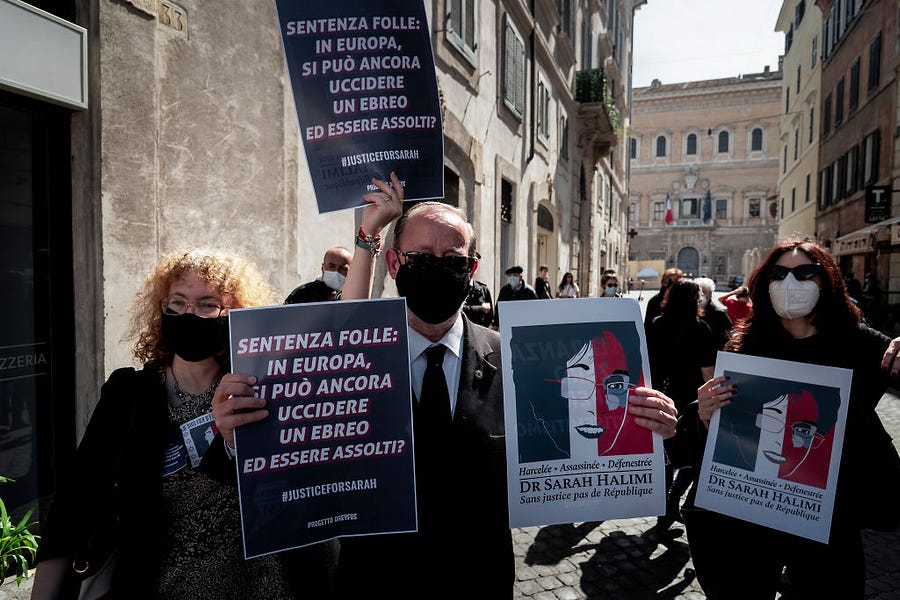What does it say about France that its justice system can’t protect the elderly in their own homes?
On April 14, France’s highest court ruled that Kobili Traoré, a 27-year-old Malian immigrant, would not be tried for the 2017 murder of Sarah Halimi, his 65-year-old Jewish neighbor. Nobody disputes the facts of the case; indeed, Traoré has admitted to the killing, in which he beat Halimi, a retired doctor and teacher, and threw her from her third-floor balcony. Neighbors testified to hearing “Sarah Halimi’s ‘bestial’ cries while Kobili Traoré beat her savagely, cried out ‘Allahu akbar,’ ‘shut your mouth,’ and ‘you sheitan!’ (devil or Satan).”
Traoré, “a petty delinquent … and an occasional drug user and dealer with 22 convictions on his rap sheet,” has been in a psychiatric institution since Halimi’s death. During that time, the court heard from seven experts—an unusually large number—about whether Traoré’s “delirium” was a one-time psychotic episode or heralded a mental illness. The answer to that single question determined whether he could stand trial, under French law. And after hearing extensive evidence, the judge decided against having a trial.
On a call, Marc Weitzmann, a French journalist and the author of Hate: The Rising Tide of Anti-Semitism in France (and What It Means for Us), highlighted some facts of the case that cut against the mental illness defense. Traoré said he was triggered by seeing a menorah in Halimi’s home, but the judge took nine months to agree antisemitism was a factor. Traoré’s psychotic episode included believing his stepfather was poisoning his blood and his family’s Haitian maid was doing voodoo on him, yet no ethno-psychiatrist was called. And finally, there’s the matter of psychiatric expert Paul Bensussan’s testimony, which has fueled countless media stories about France’s excusing murder post-marijuana use. It’s Bensussan who posited that the Halimi murder signaled the early stages of mental illness, because “the psychotic episode started two days prior [to the murder], and the smoking of joints didn’t change [Traoré’s] state of mind. It helped to intensify it but didn’t create it.” Bensussan now wonders if he was mistaken, because “Traoré’s condition right now doesn’t match the prospect of a coming schizophrenia.” And if Bensussan erred, that mistake is already having major repercussions.
Outraged, tens of thousands protested in 21 cities around the world on April 25, demanding justice for Sarah Halimi. After this ruling, though, can there be justice for Halimi, and what does her case mean for French Jewry and for France more generally?
For starters, the Halimi family lawyers are talking about taking their case to the European Court of Human Rights and Israel. However, Eugene Kontorovich, director of the Center for the Middle East and International Law at George Mason University Scalia Law School, told me he’s doubtful the EU would intervene and extradition to Israel is “extremely unlikely,” since the French already prosecuted.
As for French Jewry more broadly, Simone Rodan, the Paris-based director of AJC Europe said in an email, “What kept French Jews going was the knowledge that despite this horrific reality, the French institutions were there to protect them, were there to deliver justice and were committed to fight antisemitism. This case creates profound doubts amongst many French Jews whether this is still the case.” And who can blame them, when murder merits no trial?
Rodan has observed “anguish amongst French Jews” over Halimi’s murder, as well as that of 85-year-old Holocaust survivor Mireille Knoll in 2018. “The murders occurred in Mireille Knoll and Sarah Halimi’s own homes, by their neighbors, people they had known. What does that mean for French Jews? We can try and protect Jews in synagogues, Jewish institutions, Jewish schools, even possibly kosher supermarkets. But how do we protect Jews in their own homes? This is a frightening question that no one really knows how to answer.”
French President Emmanuel Macron has spoken up in defense of Halimi, publicly calling for a trial. He seemingly wanted to help, but members of the French judiciary believed Macron was meddling, which was decidedly unhelpful. “Macron has [also] said ‘Jews are France’” Ellie Cohanim, the former deputy special envoy to combat antisemitism said, “but the government doesn’t back up that statement, and the judiciary has not.”
The French government’s track record has indeed been poor. Rodan noted that over the past 20 years, there have been 12 antisemitic murders and “ 300 to nearly 1,000” antisemitic hate crimes annually. Jews represent less than 1 percent of France’s population but are targeted in “40-50% of all violent hate crimes.” And in Halimi’s case, six police officers literally stood by while she was murdered within earshot.
Macron recently urged the justice minister to update French law to prevent another Halimi-like ruling. Pointing to an argument made by the French philosopher Bernard-Henri Levy that it’s “the place of the legislature to begin debate toward giving the judiciary—and the sovereign people—what they need so they no longer have to pass the buck to psychiatrists,” Rodan thinks a legal change could be “quite significant” if it meant “that once the antisemitic or racist motive is established a trial needs to take place,” while a change focusing on the “delirious state” at the heart of Halimi’s case could be helpful, without combating antisemitism to the same degree. Weitzmann, by contrast, believes “it’s not good for the Jews. Public opinion resents that; [the perception is that] if Jews aren’t satisfied with the outcome, they go to the president and ask him to change the law.”
It’s clear something needs to change, though. French law must protect all law-abiding citizens, including France’s Jews.
There’s also an inherent immorality to a society that can’t—or won’t—protect its elderly. The police and the courts were supposed to protect Sarah Halimi and bring justice to an unjust situation. They failed.
Unlike earlier antisemitic hate crimes, Halimi’s case has garnered attention beyond France’s Jewish community. Not only did a 2020 AJC Paris survey find that “73% of the French public, and 72% of French Jews, consider antisemitism a problem that affects all French society,” but Rodan has noticed “growing solidarity,” so Jews no longer protest alone. Weitzmann commented, “People don’t usually comment on the news, but they’re talking about [this case] openly. It marks people. It’s an event.” The French, and not only French Jews, appear to want closure for Sarah Halimi.
What’s worth watching is whether this case becomes a turning point for France. Rodan remarked, “Antisemitism has been tearing this country, not just Jews, apart. It is time for everyone, including the justice system, to look reality into the eye.” The question is, is France ready?
Melissa Langsam Braunstein is an independent writer and communications strategist in Washington, D.C.






Please note that we at The Dispatch hold ourselves, our work, and our commenters to a higher standard than other places on the internet. We welcome comments that foster genuine debate or discussion—including comments critical of us or our work—but responses that include ad hominem attacks on fellow Dispatch members or are intended to stoke fear and anger may be moderated.
With your membership, you only have the ability to comment on The Morning Dispatch articles. Consider upgrading to join the conversation everywhere.